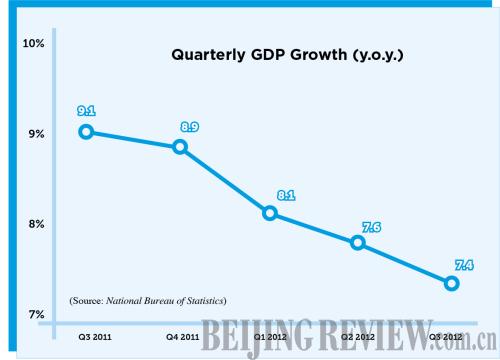|

Mild inflation
Inflation in the world's second largest economy saw a mild deceleration in September.
The Consumer Price Index (CPI), the main gauge of inflation, grew 1.9 percent year on year in September, said the NBS on October 15. The CPI grew 2 percent in August and hit a two-year low of 1.8 percent in July.
Food prices, which account for nearly one third of China's CPI, rose 2.5 percent in September from one year earlier. Slowing growth in food prices and fewer carry-over effects from last year contributed to the slight drop in inflation, analysts said.
China's producer price index (PPI), which measures inflation at the wholesale level, dropped 3.6 percent year on year in September. It marked the seventh straight month of decline since PPI fell in March for the first time since December 2009.
Xu Lianzhong, an economist from the price monitoring center of the NDRC, said the data was quite normal and within expectations, signaling that the Chinese economy had started to stabilize.
The second half of this year has seen low inflation. Conditions are ripe for an economic recovery in the last quarter, supported by the easing of fiscal and monetary policies since the second quarter, according to economists.
"The data indicate that inflation has been significantly weakened in China. Meanwhile, domestic demand still remains low, which means that further policy loosening is needed in the Chinese economy," said Liu Ligang, an economist with ANZ National Bank Ltd.
According to the NBS, the nation's CPI grew by an average of 2.8 percent year on year in the first nine months. Liu said he believes the country is poised to meet its target of keeping inflation under 4 percent for the year.
Liu said that as inflation lessens and the economy faces downward pressure, cutting the reserve requirement ratio of banks is still needed to spur the economy for the rest of the year.
However, some experts held a different opinion, suggesting any further loosening of monetary policies may lead to side effects, like a rebound in housing prices that the Central Government is trying to avoid. Also, China is facing the danger of imported inflation after a new round of quantitative easing (QE3) was rolled out in the United States.
Although the country's economy, especially its industrial sector, is faced with increasing deflationary pressure, Xu does not expect huge stimulus measures to be issued within the year. On the other hand, fine-tuning fiscal and monetary policies could be possible.
Alaistair Chan, an economist with Moody's Analytics, a division of Moody's Corp., agrees with Xu.
Mild inflation in September is unlikely to give the government much scope for further stimulus actions, said Chan.
Chan noted that inflation in housing and household goods has been resilient, and the likelihood of further interest rate and reserve ratio cuts has been diminished.
In order to buoy growth, the central bank has cut the reserve requirement ratio twice this year. It has also lowered the benchmark interest rates twice.
E Yongjian, a researcher with Bank of Communications, also said that it has become less necessary to lower the reserve requirement ratio or interest rates than it was during the rest of the year, as M2 growth expanded at a record speed in September and current inflation stands at a low level. M2, which measures cash in circulation and all deposits, rose 14.8 percent year on year in September, marking the highest level since July 2011, said the central bank on October 13.
"September's monetary data shows that credit and bond issues have already been relaxed to support economic growth," said Huang Yiping, chief economist for emerging Asia at the investment banking division of Barclays.
Huang said a further interest rate reduction in the last three months of this year has been constrained by concerns about a rebound in property prices.
Analysts say that the CPI was unlikely to see a significant rebound in the rest of the year, but China should be prepared for so-called "imported inflation" caused by the new round of QE3.
"QE3 will lift commodity prices. The price increases will be passed on to China because the country is a huge importer of commodities," said Zhuang Jian, senior economist at the Asian Development Bank, China Representative Office.
"If the rebound continues, we think policymakers are likely to lean more toward a 'wait-and-see' approach, especially in the absence of signs that employment is deteriorating," said Helen Qiao, a senior economist with the Morgan Stanley Asia Ltd.
| 